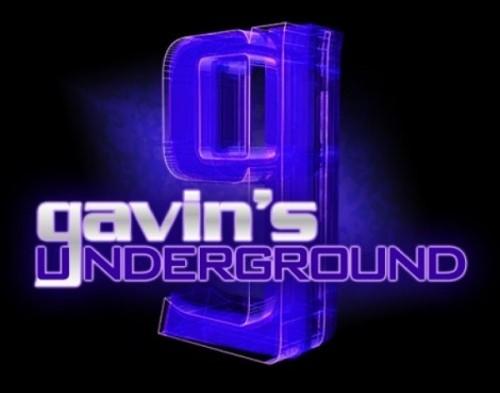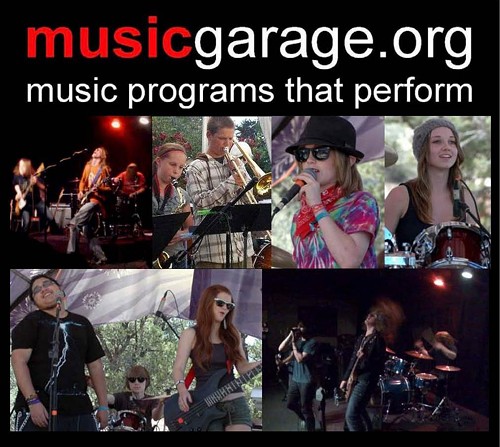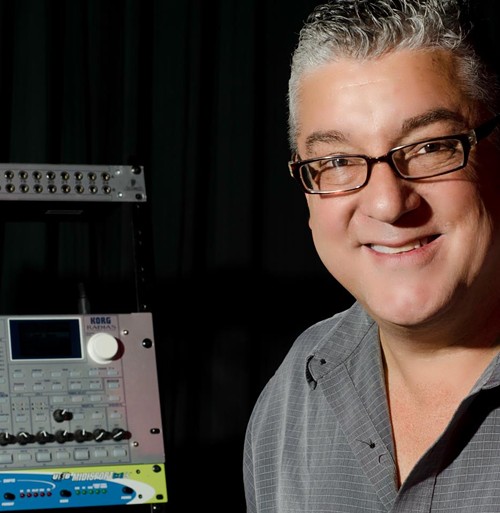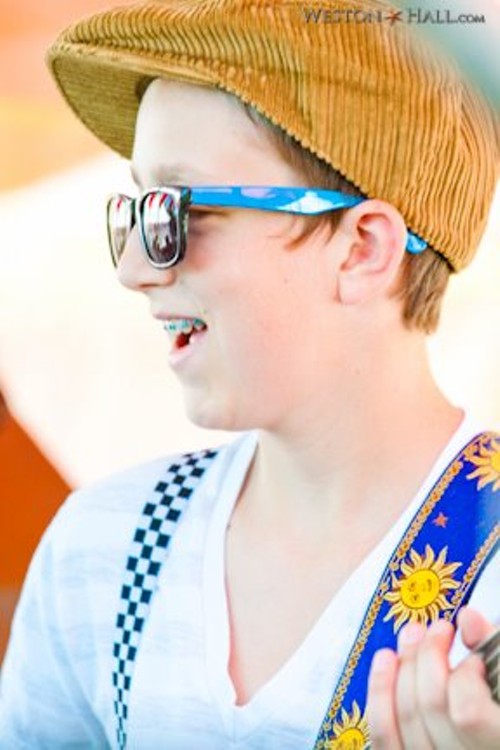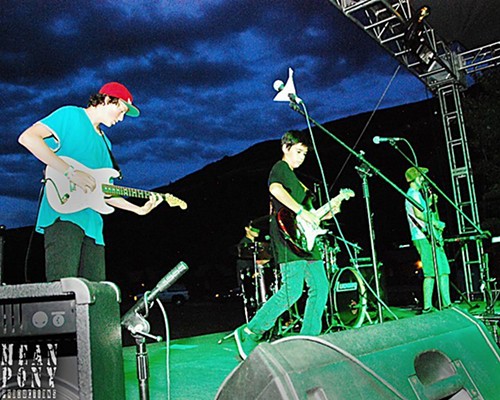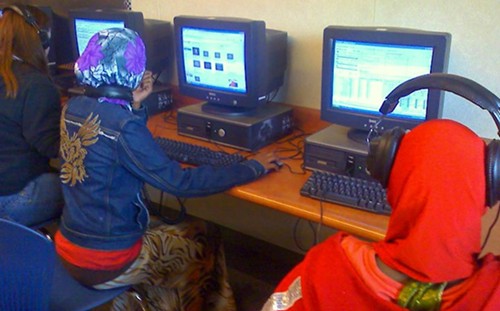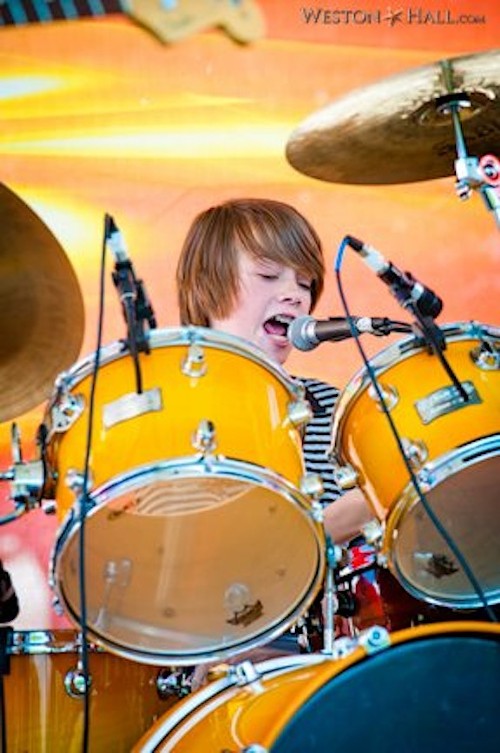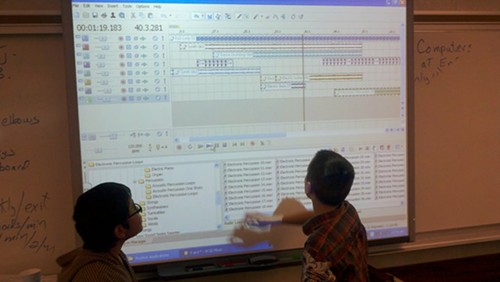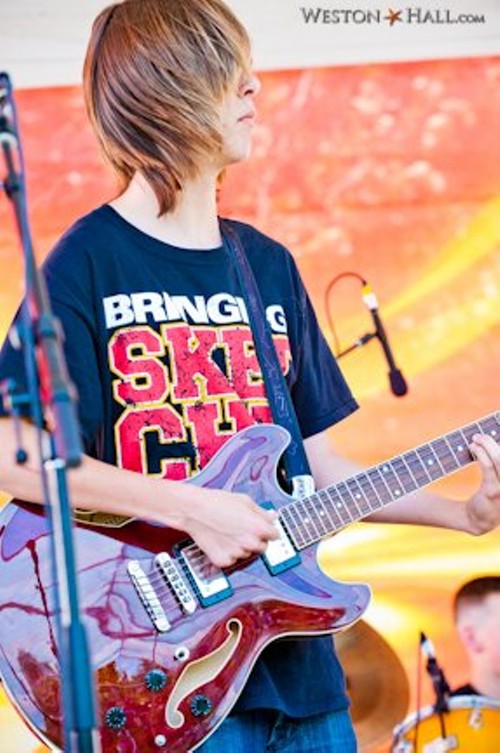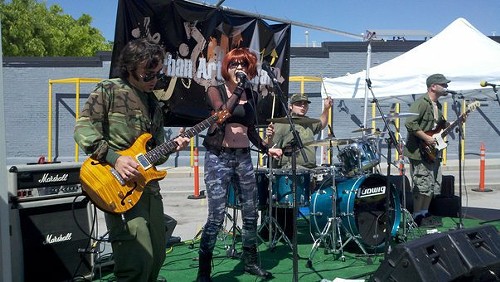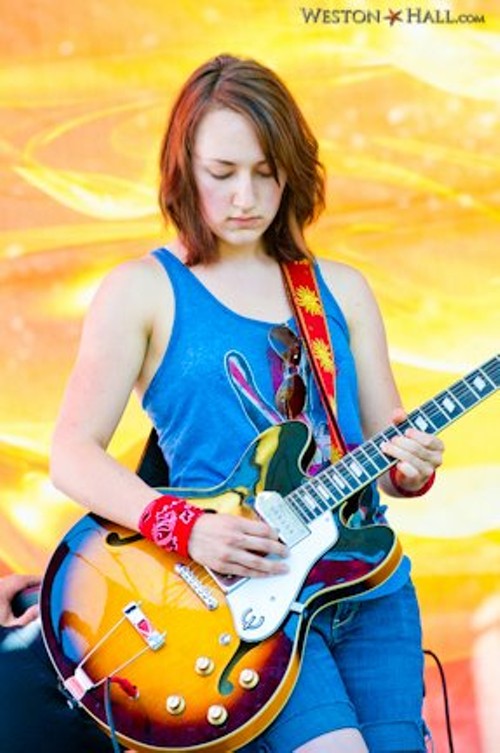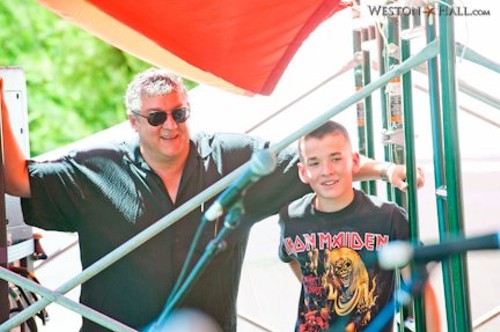Sunday, September 16, 2012
MusicGarage.org
Posted By Gavin Sheehan on September 16, 2012, 11:59 PM
There are a lot of opportunities for the younger generations to get involved with music through the various "rock schools" in town, but few have expanded their reach to that of a full-fledged facility. --- But that all changed a few years ago when MusicGarage.org was founded in South Salt Lake, a full-fledged program that allows kids to not only learn how to play music, but learn its history and what goes into making music work behind-the-scenes. Now with a large location along 1700 South that includes its own venue, the program is looking to branch out further than it has and offer opportunities beyond Salt Lake City.
Today, I chat with founder Steve Auerbach about his career in the industry both abroad and in Utah, founding Music Garage and the programs they offer, thoughts on their outreach and a few other topics. (Photos courtesy of Music Garage, some by Weston Hall and Dana Curley)
Steve Auerbach
Gavin: Hey, Steve. First thing, tell us a little bit about yourself.
Steve: I have been in and out of the music business for over 35 years. I grew up in New York in a musical family; started on clarinet, then guitar, blues harp and piano and got into synthesizers big-time. By age 17, I was a bandleader. I was recording and gigging and moved myself to LA by age 19, where my first music friends were Mike Balzary, Jack Irons, Hillel Slovak -- who became Red Hot Chili Peppers -- and Alain Johannes, whose bands included What is This?, Anthym, Them Crooked Vultures and Queens of the Stone Age. We jammed, and while under-aged, we hung out outside clubs trying to pick up girls at closing time but some kid named Anthony got ‘em all. We wore pirate shirts. I eventually got a job a Guitar Center and customers were all kinds of producers and artists who hired me to help them get cool sounds on their recordings. I got a lot of work because I knew how to get the most out synthesizers and I worked for everyone in LA at that time, from Ronnie Dio to Devo, Smokey Robinson to Tito Jackson and Van Halen to Rick James -- right place, right time, right skills.
Gavin: What eventually brought you to Utah, and what made you decide to stay here rather than move back to L.A. or elsewhere?
Steve: By age 24, I had to get out of LA before it killed me, so I came to Utah for a rehab program and started my life over as a college student at the U of U. I had a 10-year career in social work and was a consultant to Courts and Corrections, where I helped keep about 3,000 men and women stay out of prison by providing a new kind of relapse-prevention training that I learned about at the U. I had a paper published by the Utah Psychological Association and promoted the new methods to the clinical, corrections and court communities. I loved that work and was very good at it. SLC County now uses the same technology as a standard relapse-prevention model. I am very proud of that. I stayed out of music for 10 years and then got back into it by sitting in with blues bands and then got into a slew of working bands: Dick & Jane, Control, The Committed, H Street, Ike Willis & Chunga’s Revenge – some of those bands played as many as 150 gigs a year. I was busy and eventually I took over our band’s agency, Planet Agency, and grew that company to international status by recruiting my old LA rockstar friends. In 2002, I launched a record label, Uwanna? Records and produced a compilation CD for a client on the Planet Agency roster -- Ike Wills, of Frank Zappa fame. For Halloween 2001, I was invited to perform at an historic post 9/11 benefit at The Fillmore in NYC. It was a benefit for Sloan-Kettering Institute Prostate Cancer Research in Memory of Frank Zappa and I got to perform with members of Zappa's bands from the' 60s, '70s and '80s. We raised $10,000 for prostate-cancer research, which is what killed Frank Zappa. In 2003, I booked Ike Willis for an all-Frank Zappa music festival in Germany, where he was the headliner and he met Paul Green, who founded School of Rock in Philadelphia. Paul wanted help with his business and Ike referred Paul to me. Paul and I became friends, and by 2005, we opened our first western states branch in SLC just as the documentary about him, Rock School, screened at Sundance. After about 25 hires and fires, I developed a solid School of Rock staff of maybe eight teachers and built SoR branches in SLC, Sandy, Park City and Denver until 2008, when they downsized in Utah prior to selling the company. They were very respectful and actually paid me to leave the company so long as I agreed not to compete with them for 18 months. I agreed after they added another zero to that check.
Gavin: How did you first take an interest in music and what were some early influences?
Steve: My high school jazz director was my biggest musical influence; Bill Ellington was%uFFFD jazz bassist in the Latin Jazz Quintet, a seminal jazz group in the '60s. Bill gave me a chance to play piano in the jazz ensemble, but the HUGE thing that he did for me was to give me a key to a piano practice room, where my friend Mark Plati became a producer and guitarist for David Bowie, Prince and others. My pal David Lewis went on to form the hit R&B group Atlantic Starr in LA. My biggest influences in the music world were mostly keyboard players of all genres -- Chick Corea, Herbie Hancock, Rick Wakeman, Brian Eno, Joe Sample and George Duke. I was inspired by guitar players like Jeff Beck, George Harrison, Frank Zappa and Al Dimeola, but in my cynical teen years I related to Frank Zappa the most. It was inspired by his defiance of the music industry and social commentary through his art.
Gavin: What was it like for you getting involved early on, and what made you decide to seek a career behind the scenes?
Steve: I became something of an expert at sound design on all synthesizers. I was a certified Roland and Yamaha clinician and word got out quick about me. I even had a pseudonym and business name, "Steve Bach." Producers and artists called me and hired me to program the new synthesizers I sold them. I worked in their homes or at studios. Most times, it was just me, the producer and engineer tweezing the sounds, and when I got it right they more often than not asked me if I could re-cut the track. So I did. No one ever knew and I ended up with my sounds and my playing on quite a lot of famous records. They often paid me double or triple scale -- in cash! With guys like Tito Jackson picking me up to ride to Hollywood recording sessions in his Bentley, it was fine by me. Behind the scenes ruled.
Gavin: You had started your career in Los Angeles working with engineers and producers. How was it for you coming up and learning the ropes?
Steve: I was just lucky. I didn't really learn any ropes, I was just in the right place at the right time with the right skills. Geez, for my last gig in LA, I got hired by a billionaire who was starting a record label with veteran Motown producer Harry Balk. Harry taught me how to make 8-track demos sound like records. He was very old-school and gifted. It was a fantasyland in a galaxy far, far away.
Gavin: You didn't take any formal education for it. Do you ever wish you went through that process or do you prefer the way it worked out?
Steve: Correct. I had been arranging for big bands since I was a kid, so Bill Ellington taught me a lot as a kid. I got myself into the University of Utah Music Department as a teaching assistant to the composer in residence, Vladimir Ussachevsky in the electronic music lab, but ended up in social work instead of music studies. It seemed that I had my run in the music business and I never thought that I could "do better" that I did in LA in the '80s.
Gavin: What was it like for you recording albums with some top musicians at the time, and who were some of the people you got to work with over the years?
Steve: I received mostly cash and checks from Rick James, Teena Marie via Rick James, Tito Jackson, Edward Van Halen, Intercontinental Absurdities -- Frank Zappa,%uFFFD Ronnie James Dio, Kansas, Mark Mothersbaugh --Devo, Kenny Loggins, Alan Silvestri -- his first film, Romancing The Stone, and a lot of others. I received no check from Ray Parker, Jr. who "borrowed" a $12,000 synth from my boss Joe that I programmed called a PPG Wave 2.3. Ray used the damned thing for his Ghostbusters theme-song sessions and used my sounds and it was huge hit. I never minded not getting credit, but the guy never even thanked me -- much less paid me.
Gavin: Why did you choose to be a mobile producer rather than open up your own studio?
Steve: Because I am a very mediocre audio engineer and have not kept up on that stuff. I didn’t get into software audio production until 2008.
Gavin: What was your time like teaching at the U, especially during a time where the industry was growing and the ways of recording music were drastically changing?
Steve: We had old, old gear there -- it was very cool -- crazy, old, glitchy analog equipment, tape decks, as well as some newer digital stuff. But mostly old, old gear and an Otari 8-track tape deck like the one Harry Balk and I used in LA to make some seriously awesome demos of new artists. You can listen at my Myspace page.
Gavin: After the U, your career took various turns, including working for a media-tech company, being a member of several bands and even doing jingle writing. How has it been for you exploring different facets of what is essentially the same industry?
Steve: In the late '80s, after rehab while waiting tables to save enough money to go to the U of U, the owner KBER was a regular customer and he offered me a rock radio show – which I did for a year. In the early '90s, I played in tons of great working cover bands with Danny Weldon -- Legendary Porch Pounders -- and John Flanders, who I still play with in my trio with drummer Shawn Thomas -- The Chickens, Afro Omega -- called ATF: Auerbach, Thomas & Flanders. As I may have mentioned, I think that my biggest reward after U of U was Planet Agency in the mid '90s and growing it into an international concern from right here in SLC. I also did some jazz concert production: Bela Fleck at East High School -- City Weekly Concert of the Year 1997!, John McLaughlin at Kingsbury Hall and more. In 1999, I was offered a job working for one of the first media-streaming companies and did that work until I was hired to bring School of Rock to Utah in 2005.
Gavin: How did the idea to start up MusicGarage.Org come about?
Steve: In 2008, after School of Rock shut down two-thirds of the Utah operations and with the economy on the decline, SoR eventually raised its rates and School of Rock became an exclusive club for more affluent families [see editor's note below]. To me, that was not very rock & roll. Besides, the core values taught by Paul Green that attracted me to School of Rock in the first place seemed to get forgotten as the company grew. I had my own ideas about kids and music, so I came up with the idea for MusicGarage.org -- a "musician's resource center" to train kids, serve pros and support/develop locals. Of course, we started with what I was known best for around here -- a youth program that started in a 12 x 12 room! Today, we have almost 5,000 square feet of management, booking and production offices upstairs from the warehouse facility just north of Costco on 300 West. We're a member program of the Utah Arts Alliance, but they do not fund us. My hope is that they write a grant for the underprivileged kids that I presently fund myself. The youth program has zero funding other than revenues from parent fees that are based on a modest $10/hour. For readers who are interested in making a gift to MusicGarage.Org, we accept debit and credit cards both online and by phone at 801-577-2263.
Gavin: How does MusicGarage work for musicians? Considering the climate of the music scene at the time, how vital did you feel it was to have this kind of resource center for musicians in SLC?
Steve: For Utah bands, MusicGarage is SLC’s first "full equipped" hourly or daily rehearsal facility. Not all bands need or want a monthly rental and our facility is a lot nicer than any of the monthly rehearsal facilities in town. Coming in October, for bands that want their own monthly rentals, our new facility, MusicGarage II, will have monthly band rooms for rent. For kids, all proceeds go to the kid programs. For musicians who teach, we're not a music school that competes with private teachers by offering lessons. Instead, MusicGarage.Org supports local musicians who teach by organizing their students into bands to help kids stay in music lessons with private teachers longer. For touring bands, we're a 1,500 sq. ft. rehearsal hall in a warehouse with a stage, lights and sound with a huge parking lot. When the band Taking Back Sunday was here to launch the 2012 Vans Warped Tour, they came for two days of rehearsals. I signed for gear shipments all week and they parked the tour bus overnight before loading up and heading out. Plus, we're the only "laptop friendly" live video/audio digital "capture and go" venue that allows bands to take all the media with them for editing. We will also have audio- and video-editing suites, if needed. But local bands can buy a case of beer for a fan-appreciation party and capture a live show with real production values to look and sound their best on a tiny budget or even for free if their fans donate to a video fund at the door. We're also a private venue for rent. It can be used for showcases, auditions, private dinners, recitals, parties, fashion shows, spoken word, small plays, film screenings, arts shows and more. In 2013, we are expanding our artist development, management, booking and other services. We currently represent Utah’s world-renowned guitar virtuoso Terence Hansen and have had some luck booking him in Europe.
Gavin: What was it like for you getting the youth program off the ground, and what was the first year like for you?
Steve: Honestly, even after three years, we’re still a start-up. So ,it is very difficult, but very rewarding! So funny you ask -- in our first year, two "stage moms" who wanted their kids on every single song tried to sabotage the youth program and take it over to make their kids the "stars." It was crazy! As well, I am sort of competing with my former self -- School of Rock is a mature program that has a great brand name, so it has been hard to find the "right kids" with the "right skills" for this program. That said, I am VERY proud to say that we have very nice, very capable and very-hard-working kids!
Gavin: What was the process for you in compiling your staff and who do you currently have on board?
Steve: Well, for starters, we're a 100% volunteer staff; mostly me and Terence Hansen run things. But that rotates based on gigs and other commitments. Allison Martin --Cavedoll, Bellrave, Juana Ghani -- worked here in 2010-2011, and bassist Ski Nelson has been here for about six months. MusicGarage is a labor of love and a community service that invites local bands to help – it is very rewarding work ... and FUN! This season, we launch our Band Aid program that invites local bands to volunteer a couple of hours a week to coach the rehearsals, get to know the kids and then play a show at our venue with our kids as the opening act. Our kids are plenty good enough to sit in with almost any band, so it is really fun for the bands. Just ask Fat Apollo and The Cellulites! Any bands that want to check it out, hit me up. We've had workshops and "visiting professors" ranging from Paul Richards%uFFFD -- California Guitar Trio, Robert Fripp String Quartet -- Bobby Rock -- Slaughter, Neil Zaza, Doug Johns -- Bass Musician Magazine, Neal Middleton -- Rotal Bliss, Michael Lucarelli and others.
Gavin: How did you eventually come across the location on 1700 South, and what was it like changing it into a fully functional studio?
Steve: It was through Ian Brandt of Cali’s Natural Foods/Sages Cafe/Vertical Diner. Supernatural fame. Ian serves on our UAA board of directors and he had this warehouse that he wasn't using so we took over his lease. You have to come by and see the facility -- it looks like a little night club! But I could never have done it without the musicians, producers and engineers who have volunteered their time and equipment: Bob Abeyta, Ken Critchfield, Michael Ricks, Kent Rigby, Terence Hansen, Ski Nelson, Allison Martin -- they are all saints and I love them all!
Gavin: How has it been for you to see the facilities be used and watch the different works come out of it?
Steve: So cool, Gavin! We've had out-of-town guests like Taking Back Sunday, members of Earth Wind & Fire, Tina Turner and others; As well as bands from all over Utah who needed the space to work out a show for a tour, a festival gig and so forth. Fat Apollo & The Cellulites, The Jordan Soul Experience, Advent Horizon, Brad Stock and The Atomic Clock and others have used the place and I love what is happening at MusicGarage. This place will blow-up in 2013, I am sure of it!
Gavin: You also have a student program, kind of like a “school of rock.” What made you decide to start that program, and how has it been working out for the kids involved?
Steve: Per capita, MusicGarage provides 30 times the performance opportunities for kids that even the busiest youth programs in the world provide. Each of our kids play more shows than any other youth program in the world. That's right, in the w-o-r-l-d! They are happy, their parents are happy, I am happy and we are creating memories that will last a lifetime.
Gavin: What's the long-term goal for Music Garage, and are there any plans in the works to expand?
Steve: I want to enroll 50 kids by January 2013, expand to 100 kids by January 2014 and expand to a full-time staff. We've already had one franchise inquiry for the youth program in another state, but I was not ready for that. Expansion is the plan, especially with the youth program. It is so much more effective and a more generous business model than the music-school model. We're going to try some crowd funding and are starting to look for private equity investors or possibly shareholders upon reorganization in 2013. I met with one 'CFO for hire," but anyone interested in an investment opportunity should call because the opportunities are limited but the possibilities are limitless. Our model is very efficient and the CFO who I met with estimated that if we leave the UAA and go "for profit" we can still keep the rates low and grow the company nationally to a $5-10 million company. To get started on this path, we do not need that much money to expand. We can keep rates low and still make investors very happy. Heck, rates might even drop lower as we expand. Now, wouldn’t that be cool? The truth is that we are expanding to two new facilities: one for bands -- MusicGarage II, and one for visual artists -- ArtGarage. But folks need to hustle to get a space. I am considering bands on a hand-picked basis as tenants for MusicGarage II, but bands need to apply now. For ArtGarage, I am also doing the same. Artists, photographers and movement arts people need to apply now to make it happen. The nice buildings I am finding come and go quickly.
Gavin: What can we expect from you and MusicGarage over the rest of the year?
Steve: After a VERY busy summer outdoor festival season we're getting "back to normal" now. The kids have had as many as three festival sets in one weekend, from Green River to SLC -- but it is all for music and kids, so who minds? Not me, and for the most part, not our "Roccer Moms"!
Gavin: Aside from the obvious, is there anything you'd like to promote or plug?
Steve: Gavin, I am so grateful to you for helping me tell the MusicGarage story and to share my hopes for helping Utah musicians have a place to work, organize, plot and plan, who want to get out and have a career outside of Utah. That is the hardest part. For bands, artists and other creative types -- let me fix you an espresso and come see what we're about. MusicGarage.org is very special; sacred ground because it serves kids, so we do not operate like other venues. We are very deliberate and focused on what we’re doing. SLC is becoming a more mature market every day now and I am looking for booking agents, production gurus, business managers and tour managers in-house, so I want to meet with folks doing this work independently to talk about getting involved in our network. I have a proven formula to help bands get out of Utah and onto the national scene. But it is a lot of work, I cannot do it alone and I will not do it with just anyone. One reason that I work with kids because if just one group of a few of the kids that I train understand how things work and trust me to serve their best interest and they KICK ASS, then I can help them -- a lot. Same for adults, but they are tougher. Remember, I know rock stars.
[Editor's note: Steve Auerbach stated above that after 2008, School of Rock shut down two-thirds of its Utah
operations and raised its
rates. School of Rock's Ben Richards disputed the amount of the increase stated by Auerbach. As a result, the mention of SOR's monthly fee has been removed from the interview.]
| Follow Gavin's Underground: |
On Topic...
-
Film Reviews: New Releases for April 19
The Ministry of Ungentlemanly Warfare, Abigail, The Beast, Hard Miles, Sasquatch Sunset and more
- Apr 19, 2024
-
Film Reviews: New Releases for April 12
Civil War, Escape from Germany, Coup de Chance, Hundreds of Beavers, La Chimera, Sting
- Apr 11, 2024
-
Film Reviews: New Releases for April 5
Monkey Man, The First Omen, Wicked Little Letters, Girls State, Scoop, Exhuma
- Apr 4, 2024
- More Gavin's Underground » More Culture »
More by Gavin Sheehan
-
Gavin's Underground: End Of An Era
Nine and a half years of local entertainment blogging comes to an end.
- May 26, 2017
-
Torris Fairley
A quick interview with the up-and-coming SLC-based comedian.
- May 25, 2017
-
Cirque Asylum
A look into the dance school teaching unique forms of aerial arts.
- May 24, 2017
- More »


